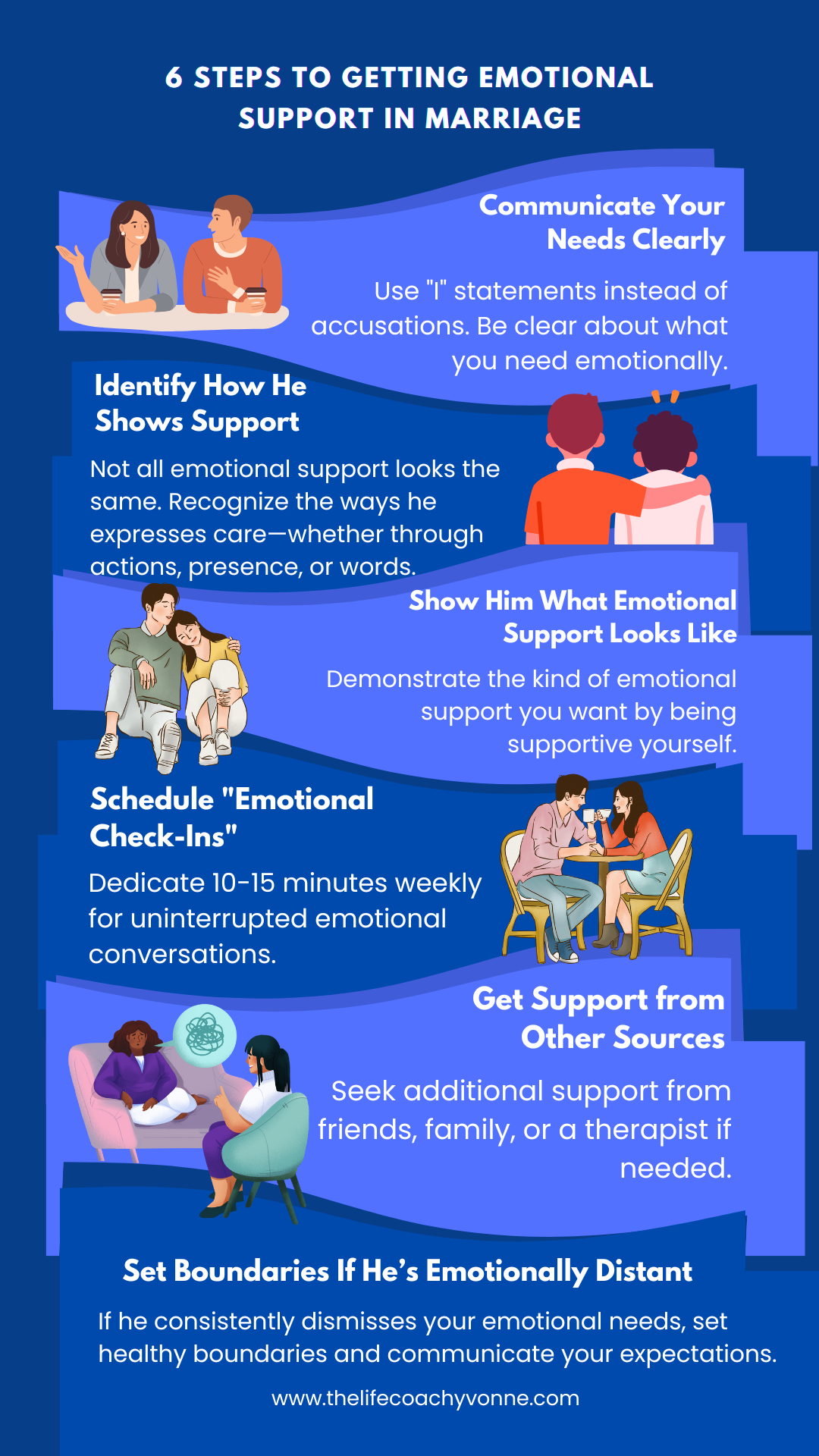What Do You Do When Your Husband Is Not Emotionally Supportive?

Because marriage is meant to be a partnership, not a solo mission.
When You Feel Emotionally Alone in Marriage
You come home after a rough day, hoping for comfort, but instead of a listening ear, you get a distracted nod, a complaint about something you didn't do, a dismissive “Stop stressing so much”, or silent cold treatment.

It feels like your husband just isn’t there for you the way you need him to be.
If this sounds familiar, you’re not alone. Many women struggle with a lack of emotional support in marriage, leaving them feeling unheard, unappreciated, and emotionally drained.
So, what can you do when your husband isn’t meeting your emotional needs?
This guide will walk you through why this happens, how to address it, and practical steps to rebuild emotional connection and support in your marriage.
Why Husbands Struggle to Be Emotionally Supportive

Before jumping to conclusions, it’s important to understand why your husband might not be offering the emotional support you need.
Here are some common reasons:
1. He Doesn’t Realize There’s a Problem
Men and women often express emotions differently. While you might show support through deep conversations and words of affirmation, he might believe that “being present” or fixing problems is enough.
2. He Wasn’t Taught Emotional Expression
Many men grow up in environments where emotional vulnerability is discouraged. If he had never seen his father or male role models providing emotional support, he may not have realized its importance.
3. Stress or Personal Struggles
If your husband is dealing with work stress, anxiety, or personal challenges, he might be emotionally unavailable not because he doesn’t care, but because he’s overwhelmed himself.
4. Different Emotional Needs
Some men simply don’t crave emotional conversations the same way women do. While you might seek deep discussions to process your emotions, he might rely on actions or shared activities to feel connected.
Understanding the root cause is key to finding the right solution. Now, let’s get into practical steps to help you get the support you need.
Step-by-Step Guide to Getting the Emotional Support You Need

1. Communicate Your Needs Clearly
Instead of assuming he knows what’s wrong, express your needs in a way that he can understand and act on.
How to Do It:
- Instead of: “You never listen to me.”
- Try: “I feel really overwhelmed right now, and I’d love for you to just listen without giving solutions.”
💡 Pro Tip: Use “I” statements instead of accusations. This reduces defensiveness and increases understanding.
2. Identify How He Shows Support (It May Be Different Than You Expect)
Not all emotional support looks the same. While you might expect deep conversations, his version of support might come in different forms, such as:
- Acts of service (helping around the house)
- Physical touch (holding your hand, hugging you)
- Problem-solving (offering solutions instead of just listening)
💡 Pro Tip: Pay attention to how he supports you in other areas of life. He might be showing love in ways that aren’t obvious.
3. Show Him What Emotional Support Looks Like
Many men don’t naturally learn emotional communication, but they can learn from you.
How to Do It:
- Be the kind of emotional supporter you want him to be.
- When he shares something personal, listen attentively, validate his feelings, and avoid dismissing his emotions.
💡 Example:
If he talks about work stress, instead of saying “It’s not a big deal”, try: “That sounds really frustrating. I can see why that would be stressful.”
When he experiences what emotional support feels like, he’s more likely to mirror it back to you.
4. Schedule “Emotional Check-Ins”
Your husband might not naturally open up or ask about your feelings, but creating a habit can help.
How to Do It:
- Set aside 10-15 minutes weekly for uninterrupted conversation.
- During this time, each of you shares one emotional win and one struggle from the week.
💡 Pro Tip: Link this habit to an existing routine (e.g., after dinner, before bed) to make it consistent.
Related Content: Want to make these talks feel natural? Try these 10 Conversation Starters to Reconnect with Your Husband.
5. Get Support from Other Sources
If your husband genuinely struggles with emotional conversations, don’t expect him to be your sole source of support.
Alternative Sources of Emotional Support:
- Close friends or family
- A support group for women
- A life coach or therapist
💡 Pro Tip: Encouraging your husband to talk doesn’t mean replacing your existing support system. A balanced mix keeps you emotionally fulfilled.
6. Set Boundaries If He’s Emotionally Distant
If your husband consistently refuses to provide emotional support or is dismissive of your needs, setting healthy boundaries is essential.
What This Looks Like:
- Address the issue: “I feel lonely in our marriage, and I need to know if you’re willing to work on this together.”
- Set expectations: If he refuses to improve communication, consider couples counselling or personal support strategies.
💡 Remember: You deserve emotional support in your marriage. Don’t settle for prolonged neglect of your emotional needs.
FAQs: Emotional Support in Marriage

Frequently Asked Questions (FAQs) About Emotional Support in Marriage
an 1. Why is my husband not emotionally supportive?
Your husband may not realize he’s emotionally distant. Many men grow up without learning how to express emotions, or they may be dealing with their own stress. Instead of assuming he doesn't care, try understanding his perspective and finding ways to encourage open conversations.
2. How do I talk to my husband about emotional support?
Start with 'I' statements like, "I feel lonely when we don’t talk about our feelings." Avoid blame, keep the conversation calm, and choose the right moment—like during a walk or while doing an activity together.
3. What are signs my husband is emotionally distant?
Signs of emotional distance include avoiding deep conversations, dismissing your feelings, showing little affection, or shutting down during conflicts. If he’s always distracted or uninterested in your emotions, it could mean he struggles with emotional connection.
4. What can I do if my husband won’t change?
If your husband refuses to acknowledge the issue, set boundaries to protect your emotional well-being. Let him know how his emotional distance affects you. If nothing changes, seeking support through coaching, therapy, or a support group can help you gain clarity on the next steps.
5. Can I build an emotional connection without forcing him to talk?
Yes! Some men connect better through actions rather than words. Try bonding through shared activities, like watching a movie, cooking together, or taking a walk. Non-verbal cues like touch and small gestures can also strengthen emotional closeness over time.
Build Your Knowledge with Internal Resources
- Improving Communication in Marriage – A must-read for overcoming communication barriers.
- 10 Conversation Starters to Reconnect with Your Husband – Get simple yet effective ways to spark deeper conversations.
Expert Advice from Trusted External Sources
- American Psychological Association: Emotional Validation – Learn why emotional validation is key to healthy relationships.
- The Gottman Institute: Practical Listening Strategies – Backed by science, these strategies help build stronger marriages.
Final Thoughts: Take the Next Step Toward a More Supportive Marriage
If you’re tired of feeling emotionally disconnected, take action today.
💡 Join our FREE 7-Day E-Course: "7 Days to Better Communication and Deeper Connection in Your Marriage."
💖 Work with Me for Personalized Marriage Coaching: Get tailored guidance to improve your emotional bond.
Because you deserve to feel heard, valued, and emotionally supported in your marriage.
